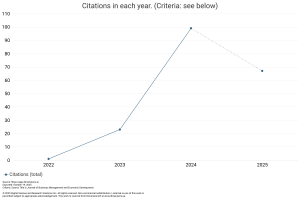Implementation of the COSO ERM-Based Internal Control System in Marketing Management at Bank Mandiri
DOI:
https://doi.org/10.59653/jbmed.v3i02.1891Keywords:
Internal Control System, Enterprise Risk Management, marketing managementAbstract
The Internal Control System (ICS) is a crucial element in ensuring that an organization's objectives are achieved effectively and efficiently, maintaining the integrity of financial reports, protecting organizational assets, and ensuring compliance with applicable regulations. This study aims to evaluate the effectiveness of implementing ICS based on the COSO Model Enterprise Risk Management (ERM) components at Bank Mandiri KCP Cikurubuk, Tasikmalaya. The methodology used in this study is a qualitative approach with a case study, where data was collected through in-depth interviews, documentation, and observations of the ICS application in marketing procedures and policies. The results of the study indicate that the implementation of ICS at Bank Mandiri KCP Cikurubuk has been running well and is relatively effective in controlling risks and monitoring performance. In particular, the supervision of marketing policies has been in accordance with the established procedures, and there has been adequate follow-up by the Government Internal Supervisory Apparatus (APIP) to maintain the sustainability of this effectiveness. The conclusion of this study is that the ICS implemented at Bank Mandiri KCP Cikurubuk is effective and efficient in supporting the achievement of organizational goals, as well as providing a solid foundation for better internal supervision in the future.
Downloads
References
Amelia, A., Ardani Manurung, K., & Daffa Baihaqi Purnomo, M. (n.d.). Mimbar Kampius: Jurnal Pendidikan dan Agama Islam Peranan Manajemen Sumberdaya Manusia Dalam Organisasi. https://doi.org/10.17467/mk.v21i2.935
Anggriany, E., & Hasnawati. (2023). PENGARUH KEPEMIMPINAN TRANSFORMASIONAL, SISTEM PENGENDALIAN INTERN, DAN INOVASI TERHADAP KINERJA ORGANISASI SEKTOR PUBLIK. Jurnal Ekonomi Trisakti, 3(1), 1239–1246. https://doi.org/10.25105/jet.v3i1.16026
Edi Mulyanto, A. (n.d.). ANALISIS SISTEM PENGENDALIAN INTERNAL PENGELOLAAN DANA BUMDES BANTAL ASEMBAGUS SITUBONDO (Vol. 3, Issue 1).
Deni, A., Riswanto, A., Tinggi, S., Ekonomi, I., & Sukabumi, P. (2019). Pemberdayaan Karyawan (Employee Empowerment) dalam Pespektif Kajian Jurnal Manajemen Sumberdaya Manusia (Issue 2).
Dwi Sukmawati, N., Ermayanti Susilo, D., & PGRI Dewantara Jombang, S. (2023). PENGARUH SISTEM PENGENDALIAN MANAJEMEN DAN PENGENDALIAN INTERNAL TERHADAP KINERJA KEUANGAN PADA RUMAH SAKIT JOMBANG. 7(3), 2023.
Elfani, A., Nurjanah, Y., & Munawar, A. (n.d.). PERANAN SISTEM INFORMASI AKUNTANSI PIUTANG TERHADAP PENGENDALIAN PIUTANG (Studi kasus pada PT. Arwinda Perwira Utama).
Hanifah, A. M., Kuntadi, C., & Pramukty, R. (2023). LITERATURE REVIEW: PENGARUH SISTEM PENGENDALIAN INTERNAL, PERAN AUDIT INTERNAL, KOMITMEN MANAJEMEN TERHADAP GOOD CORPORATE GOVERNANCE. JURNAL ECONOMINA, 2(6), 1318–1330. https://doi.org/10.55681/economina.v2i6.605
Ilmiah, J., & Akuntansi, K. (2021). ANALISIS SISTEM PENGENDALIAN INTERNAL TERHADAP FUNGSI PENERIMAAN KAS PADA RUMAH SAKIT ORTHOPEDI DAN TRAUMATOLOGI SURABAYA (Vol. 14, Issue 1). http://journal.stekom.ac.id/index.php/kompak
Margaretha, R. (2013). ANALISIS SISTEM PENGENDALIAN INTERN PENERIMAAN DAN PENGELUARAN KAS PADA PT. SINAR GALESONG PRIMA CABANG MANADO.
Ngurawan, Y. (2021). EVALUASI SISTEM PENGENDALIAN INTERNAL PEMBERIAN KREDIT DI PT. BANK SULUT GO.
Nursyahriana, A., Hadjat, M., & Tricahyadinata, I. (2017). Analisis Faktor Penyebab Terjadinya Kredit Macet. FORUM EKONOMI, 19(1).
Penulis, N., Anastasia, M., Rahmayanti, N. P., Anizar, S., & Andriani, N. W. (2020). Sistem Pengendalian Intern Pembelian Dan Penjualan Barang Pada CV. Intiga Harapan Banjarbaru Corresponding Author Sekolah Tinggi Ilmu Ekonomi Pancasetia Banjarmasin, Indonesia. Tahun, X(2), 2715–7016.
Rahmi, F. (2017). DAMPAK SISTEM PENGENDALIAN INTERNAL, PRILAKU TIDAK ETIS, DAN MORALITAS MANAJEMEN TERHADAP KECENDERUNGAN KECURANGAN AKUNTANSI PADA PERUSAHAAN DEVELOPER DI PEKANBARU.
Ridzal, N. A., Sujana, I. W., & Malik, E. (2022). Pengaruh Kapasitas Sumber Daya Manusia, Pemanfaatan Teknologi Informasi Dan Sistem Pengendalian Intern Pemerintah Terhadap Kualitas Laporan Keuangan Pemerintah Daerah Kabupaten Buton Selatan. Owner, 6(3), 2944–2954. https://doi.org/10.33395/owner.v6i3.882
Santoso Program Studi Magister Kenotariatan Fakultas HukumUniversitas Diponegoro, B. (2019). PENYELESAIAN KREDIT BERMASALAH PADA PERBANKAN INDONESIA. NOTARIUS, 12.
Studi Akuntansi Sekolah Tinggi Ilmu Ekonomi Kesatuan Bogor, P. (2018). ANALISIS PENERAPAN SISTEM INFORMASI AKUNTANSI PENGGAJIAN DALAM MENUNJANG EFEKTIVITAS PENGENDALIAN INTERNAL PENGGAJIAN Amirah Yayang Intishar & Muanas. In Jurnal Ilmiah Akuntansi Kesatuan (Vol. 6, Issue 2).
Vera Yenni. (2017). ANALISIS SISTEM INFORMASI AKUNTANSI PENGGAJIAN DALAM RANGKA EFEKTIVITAS PENGENDALIAN INTERNAL PERUSAHAAN.
Zamzami, F., & Arifin Faiz, I. (2015). EVALUASI IMPLEMENTASI SISTEM PENGENDALIAN INTERNAL: STUDI KASUS PADA SEBUAH PERGURUAN TINGGI NEGERI. Jurnal Akuntansi Multiparadigma JAMAL, 6.
Downloads
Published
How to Cite
Issue
Section
License
Copyright (c) 2025 Dwiyan Al Rasyid, Dim Zarita Suryanugraha, Rizal Fahmi Syaiful, Nadya Ayu Lestari, Nadia Ulfa Agustin Hilman, Ana Sakinatun Nisa, Asep Muhammad Adam

This work is licensed under a Creative Commons Attribution-ShareAlike 4.0 International License.
Authors who publish with this journal agree to the following terms:
- Authors retain copyright and grant the journal right of first publication with the work simultaneously licensed under a Creative Commons Attribution-ShareAlike that allows others to share the work with an acknowledgement of the work's authorship and initial publication in this journal.
- Authors are able to enter into separate, additional contractual arrangements for the non-exclusive distribution of the journal's published version of the work (e.g., post it to an institutional repository or publish it in a book), with an acknowledgement of its initial publication in this journal.
- Authors are permitted and encouraged to post their work online (e.g., in institutional repositories or on their website) prior to and during the submission process, as it can lead to productive exchanges, as well as earlier and greater citation of published work (See The Effect of Open Access).





























